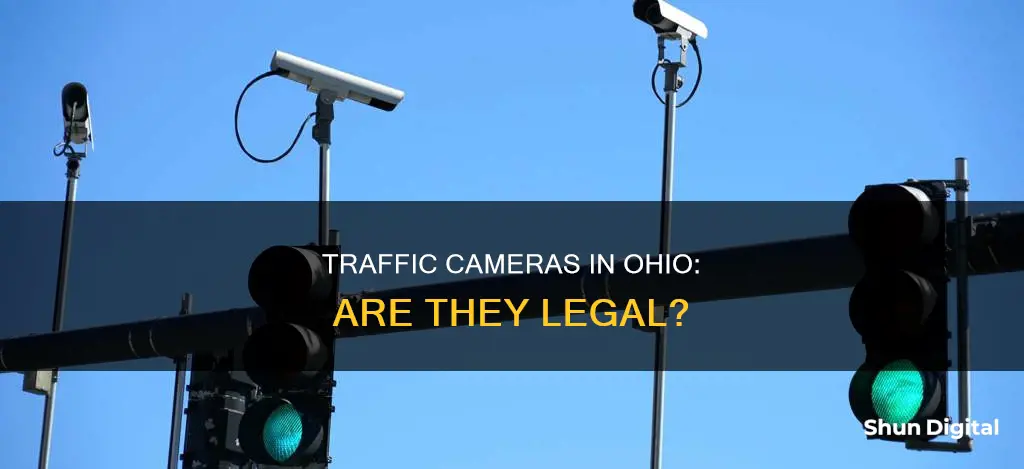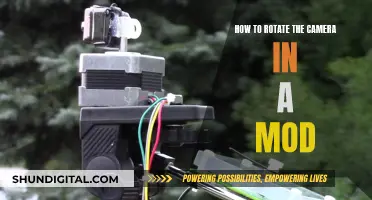
Traffic cameras are legal in Ohio, but their usage has been a topic of debate. While some cities in Ohio have chosen to remove traffic cameras, others continue to use them for enforcing traffic rules. The legality of traffic cameras in the state is determined by both state law and individual city ordinances and court rulings. Ohio passed a law in 2004 that allowed cities to install red-light and speed cameras to issue tickets to drivers violating traffic laws. However, a 2015 law required a police officer to be present at the camera location, leading to some cities dismantling their camera systems. In 2019, another law was enacted, allowing the state to financially penalize cities that use automated cameras to cite motorists. This law was upheld by the Ohio Supreme Court, which ruled that it did not violate the Home Rule Amendment.
| Characteristics | Values |
|---|---|
| Are traffic cameras legal in Ohio? | Yes, traffic cameras are legal in Ohio. |
| Who can use traffic cameras? | Local authorities, including county or township law enforcement officers. |
| Are there any conditions on their use? | Yes, a law enforcement officer must be present at the location of the device during its operation, and the local authority must comply with specific sections of the Ohio Revised Code. |
| Can traffic cameras be used on all roads? | No, they cannot be used to enforce or detect traffic violations on interstate highways. |
| What happens if a traffic violation is recorded without an officer present? | The local authority may issue a ticket, but only in accordance with specific sections of the Ohio Revised Code. |
| Can townships use traffic cameras on interstate highways? | No, townships are specifically prohibited from using traffic law photo-monitoring devices on interstate highways. |
| Can traffic camera tickets be enforced? | Yes, failure to respond to a camera ticket or appear in court can lead to a driver's license suspension and increased fines and insurance premiums. |
| Are there any challenges to the legality of traffic cameras in Ohio? | Yes, there have been legal challenges based on citing the violation without the driver's identity, violating equal protection and due process clauses, and contradicting city traffic codes. |
| What is the impact of the Ohio Supreme Court's decision on the use of traffic cameras? | The Court upheld a 2019 state law that financially punishes cities that use automated cameras to catch motorists speeding or running red lights, creating a disincentive for cities to use them. |
What You'll Learn

Are traffic cameras legal in school zones?
The use of traffic cameras in Ohio is a contentious issue that has been the subject of much debate and legal challenges in recent years. While traffic cameras are generally legal in Ohio, there are specific rules and requirements that govern their use, and these can vary between different cities and municipalities.
In 2004, Ohio passed a law permitting cities to install red-light and speed cameras to issue tickets to drivers violating traffic laws. However, the legality of traffic cameras is determined not only by state law but also by individual city ordinances and court rulings. While some cities in Ohio have embraced the use of traffic cameras, others have chosen to remove them.
So, what about school zones? Are traffic cameras legal there?
The use of traffic cameras in school zones in Ohio is specifically mentioned in a few sources. Firstly, according to Section 4511.093 of the Ohio Revised Code, a traffic law photo-monitoring device can be used to detect and enforce traffic law violations, but with certain stipulations. One of these stipulations is that the device cannot be used to enforce or detect traffic violations on interstate highways. This suggests that traffic cameras can be used in school zones, as long as they are not on interstate highways.
Additionally, in a 2018 case, the Ohio Supreme Court struck down a requirement for a ban on citing drivers unless they are speeding at least 6 mph faster in school zones, parks, and recreation areas. This implies that traffic cameras can be used to enforce speed limits in school zones, but with a lower threshold for issuing tickets.
In terms of financial implications, the Ohio Supreme Court upheld a 2019 state law that reduces state funding to municipalities with traffic cameras based on the revenues received from citations. However, this law specifically exempts citations generated from traffic cameras in school zones. Municipalities are not required to pay the costs and fees associated with civil actions commenced by traffic cameras in school zones. This suggests that the financial disincentives for using traffic cameras do not apply in school zones.
In summary, traffic cameras in school zones appear to be legal in Ohio, as long as they adhere to certain requirements and stipulations. The use of traffic cameras in school zones is not subject to the same financial penalties as in other areas, indicating that there may be a greater level of leniency or encouragement for their use in these sensitive areas.
Amcrest Cameras: Made in China?
You may want to see also

Do traffic camera tickets affect insurance rates?
In Ohio, the use of traffic cameras is legal. A 2004 law permits cities to install red-light and speed cameras to issue tickets to drivers who break traffic rules. However, the legality of these cameras is based not only on state law but also on individual city ordinances and court rulings. While some cities in Ohio have embraced traffic cameras, others, like Garfield Heights, have removed them due to the high costs of operating and enforcing them.
Now, do traffic camera tickets affect insurance rates?
In most states, red light camera and speeding camera tickets do not impact car insurance rates. This is because these tickets are generally treated as non-moving violations, similar to parking tickets or tickets for expired registration. They are considered civil or administrative violations that do not result in points on your driver's license or become part of your driving record.
However, there are exceptions. In Arizona, California, and Oregon, red light camera and speeding camera violations can add points to your license, which may lead to higher insurance premiums. In Oregon, a red light camera ticket is even considered a Class B traffic violation.
Therefore, if you receive a traffic camera ticket, it is important to understand how your state and insurance company treat these violations. While your insurance rates may not be immediately affected, accumulating points on your license could eventually lead to increased insurance costs.
In the case of Ohio, while traffic camera tickets are enforceable and can result in fines, they are typically considered civil violations. As a result, they usually do not appear on your driving record and should not directly impact your insurance rates. However, it is always a good idea to review the specific laws and regulations in your state, as well as consult with a local attorney if you have any concerns or questions.
The Evolution of Camera Boxes: Materials and Design
You may want to see also

Can you ignore a traffic camera ticket?
In Ohio, traffic cameras are legal and enforceable. A 2004 law allowed cities to install red-light cameras and speed cameras to issue tickets to drivers who violate traffic laws. However, the legality of traffic cameras is based not only on state law but also on individual city ordinances and court rulings. While some cities in Ohio have chosen to remove traffic cameras, over 20 cities in the state rely on camera tickets to enforce traffic rules.
If you receive a camera speeding ticket in Ohio, ignoring it may not be the best option. Failure to respond to a camera ticket or appear in court can lead to a driver's license suspension, and the fine will increase. Your driving record will be negatively affected, and you may receive a court summons, resulting in additional legal fees and time costs.
Instead of ignoring the ticket, it is advisable to either pay it or dispute it in court. If you choose to dispute the ticket, you can present evidence that the camera was malfunctioning, the speed limit signs were unclear or not visible, or you were not the driver at the time of the violation.
It is important to note that traffic cameras in Ohio are subject to certain stipulations. According to Section 4511.093 of the Ohio Revised Code, a local authority can use a traffic law photo-monitoring device to detect and enforce traffic law violations only if a law enforcement officer is present at the location of the device during its operation. Additionally, traffic cameras cannot be used to enforce or detect traffic violations on interstate highways.
Charging Enel3e Camera Battery: Alternative Methods to Try
You may want to see also

What are the consequences of not paying a traffic camera fine?
In Ohio, traffic cameras are legal and enforceable. However, there are certain stipulations that must be met for a traffic camera ticket to be valid. For example, a law enforcement officer must be present at the location of the camera during its operation.
If you receive a traffic camera ticket in Ohio, it is important to take it seriously. While these tickets are typically considered civil violations that result in financial penalties, ignoring them can have consequences. Firstly, the fine associated with the ticket will increase if it is not paid promptly. Secondly, your driving record may be negatively impacted, which could affect your car insurance rates and potentially result in a license suspension. Additionally, failing to address a traffic camera ticket may result in a court summons, leading to further legal fees and complications.
It is worth noting that camera tickets in Ohio do not appear on your driving record as they are usually considered civil violations. However, this does not absolve you from the responsibility of addressing the ticket. If you choose to dispute the ticket, you have the option to present your case in court, where you may be able to avoid the ticket altogether if it was issued incorrectly. Alternatively, you can consult with a traffic ticket attorney who can guide you through the process and help you understand your options.
In summary, while traffic camera fines in Ohio may seem like a minor inconvenience, ignoring them can lead to more significant consequences, including increased fines, negative impacts on your driving record, and potential legal complications. It is always best to address these tickets in a timely manner to avoid further issues.
Covering Webcams: Privacy, Security, and You
You may want to see also

What are the legal challenges to traffic camera tickets?
In Ohio, traffic camera tickets can be legally challenged on several grounds. Here are some of the legal challenges that can be made against traffic camera tickets:
Presence of a Law Enforcement Officer
According to Section 4511.093 of the Ohio Revised Code, the use of traffic law photo-monitoring devices is subject to specific conditions. One of the conditions stated in the code is that a law enforcement officer must be present at the location of the device during its operation. Therefore, a legal challenge can be made if a law enforcement officer was not present when the alleged traffic violation was recorded by the camera.
Violation of Equal Protection and Due Process Clauses
In Ohio, traffic camera tickets have been challenged on the basis of violating the equal protection and due process clauses. This argument has been used in other states as well, such as in a 2008 appeal to the 7th Circuit Court of Appeals, where car owners in Chicago received a citation for running a red light. However, in that case, the federal judges ruled against the appellants, stating that there is no fundamental right to run a red light or avoid being seen by a camera on a public street.
Identity of the Driver
Another legal challenge to traffic camera tickets in Ohio is citing the violation without identifying the driver. In some states, such as Missouri, the state Supreme Court has ruled that automated traffic enforcement programs are unconstitutional unless the state can provide proof of the driver's identity at the time of the offense.
Contradiction with City's Traffic Codes
Traffic camera tickets in Ohio have also been challenged on the basis that they contradict the city's own traffic codes and regulations.
Improper Installation or Functioning of the Camera
When disputing a traffic camera ticket, individuals can challenge the accuracy of the camera or its installation. For example, presenting evidence that the camera was not functioning correctly or that the speed limit signs were not clear or visible can be a valid legal challenge.
Troubleshooting Cam4 Cameras with Adobe: A Guide
You may want to see also
Frequently asked questions
Yes, traffic cameras are legal in Ohio. In 2004, Ohio passed a law that allowed cities to install red-light and speed cameras to issue tickets to drivers who violate traffic laws.
No, the usage of traffic cameras varies across cities and municipalities in Ohio. Some cities, like Columbus and Cleveland, have removed their traffic cameras.
According to Section 4511.093 of the Ohio Revised Code, a local authority can use a traffic law photo-monitoring device to detect and enforce traffic law violations only if a law enforcement officer is present at the location of the device during its operation. Traffic cameras cannot be used to enforce or detect traffic violations on interstate highways.
No, ignoring a traffic camera ticket is not advisable. Failing to respond to the ticket or appear in court can result in a driver's license suspension and increased fines. It is recommended to pay the ticket or dispute it in court if you believe it was issued incorrectly.
There are legal challenges to the use of traffic cameras in Ohio, including citing violations without identifying the driver, violating equal protection and due process clauses, and contradicting city traffic codes. Additionally, there is a debate over the motivation for using traffic cameras, with critics arguing that cities are primarily interested in the revenue generated rather than improving safety.







